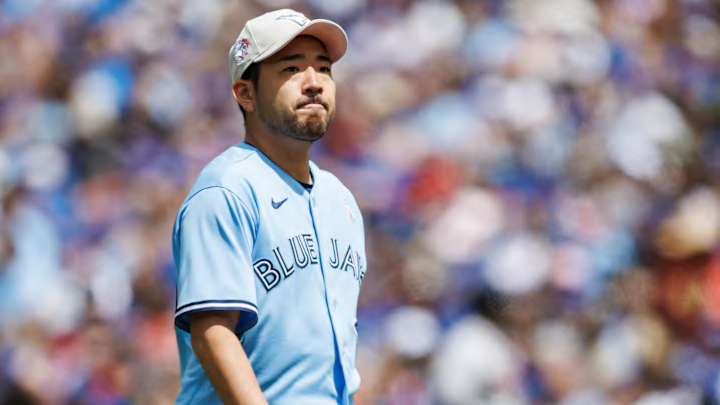After a wild and shockingly sloppy series finale last weekend against the NL East-leading Atlanta Braves, Yusei Kikuchi's less-than-stellar performance on the mound wasn't the main talking point. He can probably thank walk-off hero Danny Jansen, the resilient Blue Jays offense and questionable defense on both sides.
Kikuchi only managed to go four innings in the sweep-clinching win, being lifted after a fifth-inning leadoff single. With an unflattering line of five runs (four earned) on nine hits, including three home runs, the 31-year-old's Jekyll and Hyde season continues. He did strike out seven, but that wasn't enough to overcome his third multi-homer outing of the year.
Ronald Acuna Jr. - Atlanta Braves (8)
— MLB HR Videos (@MLBHRVideos) May 14, 2023
pic.twitter.com/KBGHSlHoOF
To be fair, the Braves have been mashing the ball this season — their 74 home runs puts them second in the majors — but that doesn't make one feel any less uneasy about Kikuchi's propensity for giving up the long ball. Even though overall, he looks better than in his first season as a Blue Jay and has gained a certain level of trust with the team and fanbase, it's a worrying trend that the club is undoubtedly working on.
He has allowed 11 home runs, the third most across baseball, with multiple round trippers given up against the Red Sox (two), Angels (three) and now the Braves. He has kept his ERA down to a serviceable 3.89 with a couple of shutout outings and three one-run outings against the Yankees, Rays and Royals.
Can you guess how those teams scored their lone runs against him? If you said the long ball, you'd be correct.
Why is Yusei Kikuchi giving up so many home runs?
Through eight starts, Kikuchi's 20.4% HR/FB ratio is lower than last season's 23.7% mark. Unfortunately, it's causing him more problems because he's giving up more flyballs. His groundball and flyball rates are essentially reversed from last year's numbers, with his career-high flyball rate up almost six points.
Year | GB% | FB% | HR/FB | HR/9 |
|---|---|---|---|---|
2022 | 43.9% | 37.0% | 23.7% | 2.06 |
2023 | 38.1% | 42.9% | 20.4% | 2.38 |
You can also point to his career-high 92.5 mph average exit velocity on batted balls. More hard contact plus more flyballs isn't a good mix, especially in the current offensive environment.
Kikuchi was probably lucky that last year's deadened ball was harder to hit over the fence. This year he's not getting that luxury. According to Baseball Savant, the ball appears to be acting more like the semi-juiced ball of 2021.
Are the balls more juiced in 2023?
— Michael Schwab (@michaelschwab13) April 6, 2023
This chart by Baseball Savant measures how much “drag” a ball has. The higher up the chart, the less it flies. 2023 is trending lower than last year.
2019… those were some juiced balls. pic.twitter.com/TBuSFNYgOi
The much-maligned lefty has done well and has been incredibly lucky to minimize the damage so far, considering the combination of an increased flyball rate with the more lively ball. Despite sporting the highest HR/9 mark of his five seasons in the majors, eight of the 11 home runs against him have been solo shots.
It's good to remember that Kikuchi is not supposed to be the staff ace. He came into the season as the de facto fifth starter. At 5-0, he has been excellent in that role for the Jays this year. That being said, if he can't get the home runs under control, his luck will eventually run out, and there could be more rocky starts with much worse results ahead.
